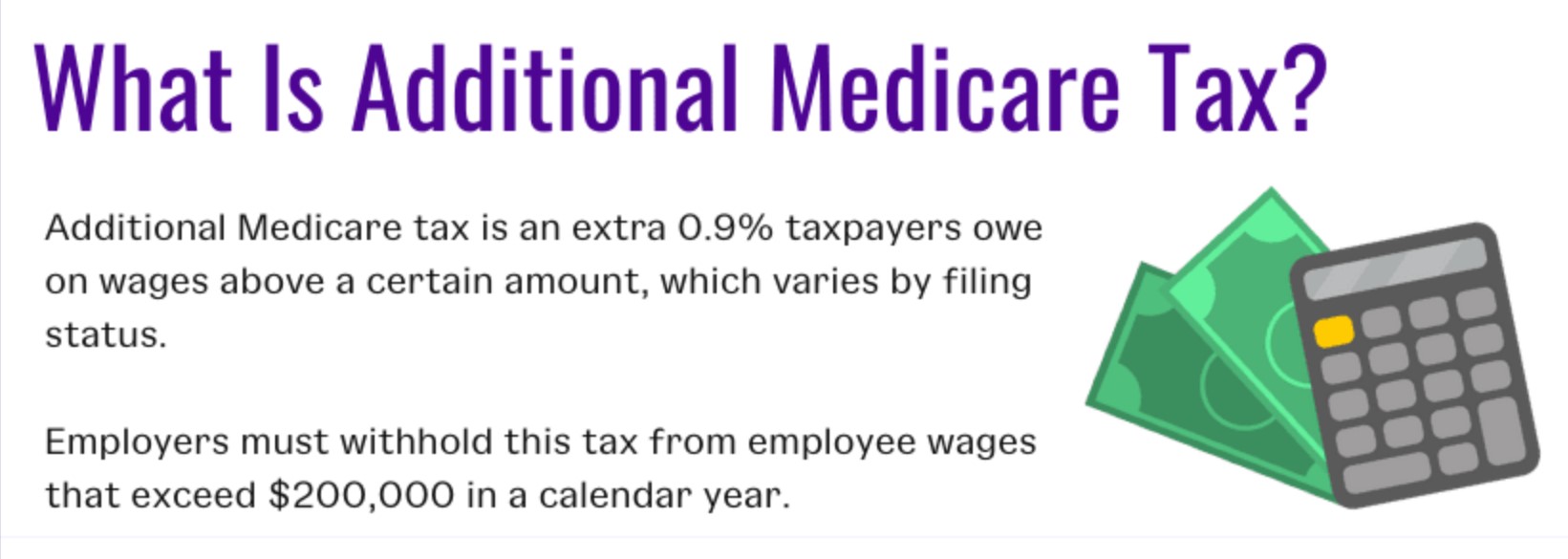A Comprehensive Guide to Medicare Tax Rates, Limits, and Deductions for 2024-2025
Medicare taxes are an essential component of the U.S. healthcare system. Contributing to funding healthcare for seniors and certain individuals with disabilities. Whether you are a business owner, an employee, or simply someone trying to understand your financial responsibilities, knowing about Medicare tax rate, limits, and deductions can help you make informed decisions. This guide explores everything you need to know about Medicare tax, including rates for 2024 and 2025, how much you’ll pay, and whether Medicare premiums are tax-deductible.
What is Medicare Tax?
Medicare tax is a payroll tax levied by the federal government on earnings to fund the Medicare program, which provides healthcare to individuals aged 65 and older, as well as certain younger people with disabilities. The tax is divided into two main components: the standard Medicare tax and the additional Medicare tax. Both taxes help fund Medicare Part A, which covers hospital insurance.

Understanding the Medicare Tax Rate
The standard Medicare tax rate is 1.45% of an individual’s earnings, with an additional 0.9% tax for high earners. This means that workers pay a total of 1.45% on all of their earned income, while higher-income earners may be required to pay more depending on their income level.
For employees, Medicare tax is withheld from their paycheck by their employer, and employers also contribute an additional 1.45% to the employee’s earnings. Self-employed individuals are responsible for paying the full 2.9% tax themselves, though they can deduct the employer portion of the tax as a business expense.
Medicare Tax Rate for 2024
In 2024, the standard Medicare tax rate remains at 1.45%. The additional Medicare tax rate of 0.9% applies to individuals whose income exceeds the threshold amount set by the IRS. For single filers, this threshold is $200,000, while for married couples filing jointly, it is $250,000.
Medicare Tax Limit for 2024
There is no upper limit on the amount of income subject to Medicare tax. This means that high-income earners will continue to pay the 1.45% Medicare tax on all earnings, and once their income surpasses the threshold, they will also be responsible for the additional 0.9% tax on the excess income.
Medicare Tax Rate for 2025
As of now, the Medicare tax rate for 2025 is expected to remain at 1.45%. However, it’s important to stay updated on potential changes to tax laws, as rates and thresholds can shift with each tax year. If any changes are announced, they could affect both the standard Medicare tax and the additional tax for high earners.
Social Security and Medicare Tax: What’s the Difference?
While both Social Security and Medicare taxes are part of the FICA (Federal Insurance Contributions Act) taxes, they serve different purposes. Social Security tax helps fund the Social Security program, which provides benefits to retirees, disabled workers, and surviving family members. Medicare tax, on the other hand, supports the Medicare program, which primarily offers healthcare coverage for senior citizens and individuals with disabilities.
Social Security and Medicare Tax Rates in 2024
For 2024, the Social Security tax rate is 6.2% on earnings up to a certain limit, known as the Social Security wage base limit. Unlike Medicare tax, the Social Security tax does have an income cap. For the year 2024, the maximum amount of earnings subject to the Social Security tax is $160,200. Once your income exceeds this limit, you will no longer have Social Security tax withheld from your paycheck for the remainder of the year.
On the other hand, the Medicare tax rate remains at 1.45%, and there is no income cap for this tax. High earners will also pay an additional 0.9% Medicare tax on earnings above the threshold.
How Much Is Medicare-Tax Rate?
The amount you pay in Medicare taxes is directly tied to your earnings. As an employee, you will pay 1.45% of your income in Medicare tax, while your employer will match that amount. If you’re self-employed, you’ll pay the full 2.9%, which is split between you and your employer as part of the self-employment tax.
Examples of Medicare Tax Payments
1) If you earn $50,000 annually, you will pay $725 in Medicare tax (1.45% of $50,000).
2) If you earn $200,000 annually, you will pay $2,900 in Medicare tax (1.45% of $200,000).
3) If you are single and earn over $200,000, you will also be subject to the 0.9% additional Medicare tax on the amount over $200,000.2)
Are Medicare Premiums Tax Deductible?
Medicare premiums can be deductible in certain circumstances, particularly if you are self-employed or if you itemize deductions on your tax return. If you are self-employed, you can deduct the cost of Medicare premiums as part of your business expenses. For individuals who are 65 and older, Medicare premiums can also be deducted as a medical expense, provided you itemize your deductions.
However, it’s essential to note that there are restrictions and limits to how much you can deduct. In many cases, Medicare premiums are considered a medical expense and must meet a certain threshold before they are deductible.

FAQs on Medicare-Tax and Deductions
What is Medicare tax?
Medicare tax is a payroll tax that funds the Medicare program, which provides healthcare for individuals aged 65 and older, as well as people with disabilities.
What is the Medicare tax rate for 2024?
The standard Medicare- tax rate for 2024 is 1.45%, with an additional 0.9% tax for high earners exceeding the income threshold.
How much is Medicare tax on wages?
Medicare tax is 1.45% of wages, with additional tax for high earners. Self-employed individuals pay the full 2.9%.
Is there a limit for Medicare tax?
No, there is no limit for Medicare tax. All earned income is subject to the 1.45% tax, and high earners may be subject to the additional 0.9% tax.
Are Medicare premiums tax-deductible?
Medicare premiums may be tax-deductible if you’re self-employed or itemizing deductions on your tax return, but they are subject to specific conditions and limits.
What is the Medicare tax rate for 2025?
The Medicare tax rate for 2025 is expected to remain at 1.45%, though it’s important to stay updated on any changes to tax laws.
Conclusion: Understanding Medicare Tax for 2024 and Beyond
Understanding Medicare tax and its rates is crucial for individuals and business owners alike. Whether you’re planning for the upcoming tax years, managing payroll, or figuring out your tax deductions, knowing how much Medicare tax you’ll pay and when you can expect changes will help you stay financially prepared. As we head into 2024 and 2025, staying informed about tax limits, deductions, and rates can make a significant difference in your financial planning and healthcare coverage.
By understanding the differences between Social Security and Medicare taxes, and staying updated on changes in tax rates, you can ensure you are fulfilling your tax obligations while making the most of potential deductions. Keep in mind that tax laws can change, and it’s always a good idea to consult a tax professional to ensure you’re taking full advantage of the benefits available to you.
Detailed Breakdown of Medicare Tax, Rates, and Deductions for 2024-2025
Medicare tax plays an important role in funding the Medicare program, which provides healthcare benefits primarily for individuals aged 65 and older, as well as certain younger individuals with disabilities. While the concept of Medicare tax is relatively straightforward, understanding the details—such as the tax rates, thresholds, and implications for various income brackets—can help individuals, businesses, and tax professionals navigate the complexities of tax planning.
This article will provide an in-depth look at the Medicare tax rates for 2024 and 2025, how much you’ll pay, the limits for high-income earners, the deductions available, and important information regarding both Social Security and Medicare taxes.
What is Medicare Tax?
Medicare tax is a type of payroll tax used to fund the Medicare program. Unlike other tax types, such as federal income tax, Medicare tax specifically supports the hospital insurance trust fund. It helps cover Part A benefits, which include hospital and other inpatient care services.
Medicare taxes are levied on earnings and self-employment income, making it essential for both employees and self-employed individuals to understand their tax obligations. It’s automatically deducted from your paycheck by employers and paid directly to the Internal Revenue Service (IRS).
Key Features of Medicare Tax:
- Funding Purpose: Primarily funds Medicare Part A, which provides inpatient hospital care, skilled nursing facility care, hospice, and some home health services.
- Employee and Employer Contributions: Employees and employers share the cost of Medicare tax, with each paying 1.45%. The self-employed pay the full 2.9% as part of the self-employment tax.
Medicare Tax Rate for 2024 and 2025
The Medicare tax rate for both 2024 and 2025 is primarily set at 1.45% of an individual’s wages. However, the tax rate is not uniform for all earners—higher-income earners face an additional Medicare tax.
The Standard Medicare Tax Rate:
- 1.45% of earned income for employees (shared equally between employee and employer).
- 2.9% for self-employed individuals, who are responsible for paying both the employee and employer portions.
Additional Medicare Tax for High Earners:
- 0.9% Additional Tax: For individuals whose income exceeds certain thresholds, the additional Medicare tax kicks in. This rate applies only to income over the following thresholds:
- $200,000 for single taxpayers or head-of-household filers
- $250,000 for married couples filing jointly
- $125,000 for married individuals filing separately
For example, if a married couple has a combined income of $300,000 in 2024, they will be subject to an additional 0.9% tax on the amount over the $250,000 threshold. Therefore, the additional Medicare tax for the couple would be assessed at $50,000 (the excess over the threshold).

Medicare Tax Limits for 2024 and 2025
Unlike the Social Security tax, the Medicare tax does not have an income cap. This means that all earnings are subject to the 1.45% Medicare tax, regardless of how much you earn. Even high-income individuals will continue paying the tax on their entire salary or wages. However, high earners will be subject to an additional 0.9% tax once their income exceeds the aforementioned thresholds.
No Income Cap on Medicare Tax:
- The standard Medicare tax rate applies to all earned income without any upper limit.
- This includes wages, salaries, bonuses, and other forms of compensation from employment.
For example:
- If you earn $1 million in a year, you’ll pay 1.45% on the full $1 million in income, and if you are above the threshold, you will also pay 0.9% additional Medicare tax on income over $200,000 (for single filers) or $250,000 (for married couples).
This structure contrasts with Social Security taxes, which have an annual wage base limit that restricts how much income is subject to taxation.
Medicare Tax for Self-Employed Individuals
Self-employed individuals are not exempt from paying Medicare tax. They must pay both the employee and employer portions of the Medicare tax. This means that self-employed individuals are responsible for a total of 2.9% of Medicare tax on their net earnings from self-employment.
How is Self-Employment Medicare Tax Calculated?
- Self-employed individuals file Schedule SE with their annual tax return to calculate their self-employment tax, which includes both the 1.45% Medicare tax and the 12.4% Social Security tax (for earnings up to the Social Security wage base limit).
- In addition to the 2.9% Medicare tax. Self-employed individuals are also subject to the 0.9% additional Medicare tax if their income exceeds the applicable threshold.
How Much is Medicare Tax for Employees?
For employees, the calculation is relatively straightforward:
- Employees pay 1.45% of their wages in Medicare tax, which is deducted automatically from their paychecks.
- Employers match the 1.45%, contributing an equal amount on behalf of the employee.
For example:
- If you earn $60,000, your Medicare tax will be 1.45% of $60,000, or $870 annually. Your employer will also contribute $870 on your behalf.
If your wages exceed the threshold for the additional 0.9% tax. That will apply to the income over $200,000 (or $250,000 for married couples).
Medicare Tax Deductions and Considerations
Are Medicare Premiums Tax Deductible?
In certain cases, Medicare premiums can be tax-deductible, but the eligibility and circumstances depend on your situation:
- For Self-Employed Individuals:. If you’re self-employed and paying for Medicare Part B (medical insurance) or Medicare Part D (prescription drug coverage) premiums, these premiums can often be deducted as part of your self-employment tax deduction. This is considered an above-the-line deduction, meaning it can reduce your adjusted gross income (AGI).
- For Retirees:. If you’re retired and itemize deductions on your tax return. You may be able to deduct your Medicare premiums (Part B, Part D, and Medicare Advantage plans) as part of your medical expenses. However, you must meet certain requirements, such as the total medical expenses exceeding a certain percentage of your AGI.
- Medicare Premiums and Taxes for High Earners:. High-income earners may pay higher premiums for Medicare, but they can still potentially deduct them if they itemize their deductions.
Medicare Tax and Employer Contributions
While employees are responsible for their Medicare tax contributions, employers are also responsible for paying a matching 1.45%. Employers are also required to withhold the 0.9% additional Medicare tax on behalf of high-income employees.
FAQs on Medicare Tax and Deductions
How is the additional 0.9% Medicare tax applied?
The additional 0.9% Medicare tax applies to wages that exceed the threshold of $200,000 for individuals or $250,000 for married couples. This tax is not matched by the employer and applies only to the amount over these thresholds.
Can I deduct my Medicare premiums?
Yes, if you are self-employed, you can deduct your Medicare Part B and Part D premiums as a business expense. Retirees may also deduct Medicare premiums as medical expenses if they meet the criteria for itemizing deductions.
What is the maximum income subject to Medicare tax?
Unlike Social Security taxes, there is no income cap for Medicare tax. This means that high-income earners continue paying the 1.45% Medicare tax on their entire income.
Conclusion: Stay Informed on Medicare Tax for 2024 and 2025
Medicare tax is an essential part of the U.S. tax system, and it’s important to understand its implications. For 2024 and 2025, the Medicare tax rate will remain consistent, with the standard 1.45% for most taxpayers, and 0.9% for high earners. Being aware of your Medicare tax rate, limits, and deductions can help you better plan your finances and avoid surprises during tax season.




